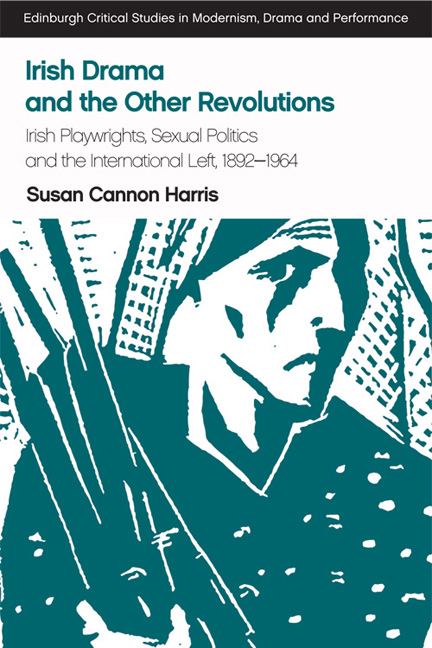 Irish Drama and the Other Revolutions
Irish Drama and the Other Revolutions Book contents
- Frontmatter
- Contents
- Acknowledgements
- Edinburgh Critical Studies in Modernism, Drama and Performance
- Introduction
- 1 Desiring Women: Irish Playwrights, New Women and Queer Socialism, 1892–1894
- 2 Arrested Development: Utopian Desires, Designs and Deferrals in Man and Superman and John Bull's Other Island
- 3 We'll Keep the Red Flag Flying Here: Syndicalism, Jim Larkin and Irish Masculinity at the Abbey Theatre, 1911–1919
- 4 Mobilising Maurya: J. M. Synge, Bertolt Brecht and the Revolutionary Mother
- 5 The Flaming Sunflower: The Soviet Union and Sean O'Casey's Post-Realism
- Epilogue: What The Irish Left – Sean O'Casey, Samuel Beckett and Lorraine Hansberry's The Sign in Sidney Brustein's Window
- Works Cited
- Index
4 - Mobilising Maurya: J. M. Synge, Bertolt Brecht and the Revolutionary Mother
Published online by Cambridge University Press: 06 January 2018
- Frontmatter
- Contents
- Acknowledgements
- Edinburgh Critical Studies in Modernism, Drama and Performance
- Introduction
- 1 Desiring Women: Irish Playwrights, New Women and Queer Socialism, 1892–1894
- 2 Arrested Development: Utopian Desires, Designs and Deferrals in Man and Superman and John Bull's Other Island
- 3 We'll Keep the Red Flag Flying Here: Syndicalism, Jim Larkin and Irish Masculinity at the Abbey Theatre, 1911–1919
- 4 Mobilising Maurya: J. M. Synge, Bertolt Brecht and the Revolutionary Mother
- 5 The Flaming Sunflower: The Soviet Union and Sean O'Casey's Post-Realism
- Epilogue: What The Irish Left – Sean O'Casey, Samuel Beckett and Lorraine Hansberry's The Sign in Sidney Brustein's Window
- Works Cited
- Index
Summary
INTRODUCTION
The emergence of a Communist state had a transformative effect on left politics and left culture around the world. Within the Soviet Union, the radical break with the past catalysed an explosion of experimental art and literature, including a vibrant avant-garde theatre movement whose influence was felt throughout Europe and in the United States (Carter, The New Theatre, v). Outside the Soviet Union, the real-world existence of an ‘other place’ where capitalism's writ did not run changed both the content and the formal expression of utopian desire. The Soviet Union became a real destination towards which that desire could yearn; it promised, much more persuasively than experiments like the Garden City could, that socialism was a functional alternative to a capitalism whose days appeared to be numbered. It promised that the hoped-for utopian future was no longer queer; that it could be, and had been, realised in straight time.
Straight time has its privileges; and it has its price. With the establishment of the Communist International in 1919 (also known as the Third International or Comintern), the Soviet Union began its bid for ideological and tactical control of an international workers’ movement of which the Communist Party had until then been only one iteration. Though it was a long, chaotic and incomplete process, the establishment of the Comintern was the beginning of the end for syndicalism. Between a wave of repressive measures taken against them by capitalist governments and the Comintern's efforts to co-opt, infiltrate, merge with, or eradicate them, most national syndicalist organisations had withered away to irrelevance by the end of the 1920s (Darlington, Syndicalism, 3). The one exception to this trend was Spain, where the anarchosyndicalist Confederacion General del Trabajo (National Confederation of Labor, or CNT), remained a thorn in the side of their Marxist and Communist competitors and a major obstacle to Soviet hegemony – from the establishment of Spain's republican government in 1931, to the very bitter end of the Spanish Civil War in 1939.
The survival of anarcho-syndicalism and other non-Communist and anti- Communist left organisations in Spain helped make it one of the most dramatic, compelling and tragic subjects for left writers during the 1930s.
- Type
- Chapter
- Information
- Irish Drama and the Other RevolutionsPlaywrights, Sexual Politics and the International Left, 1892–1964, pp. 135 - 168Publisher: Edinburgh University PressPrint publication year: 2017


